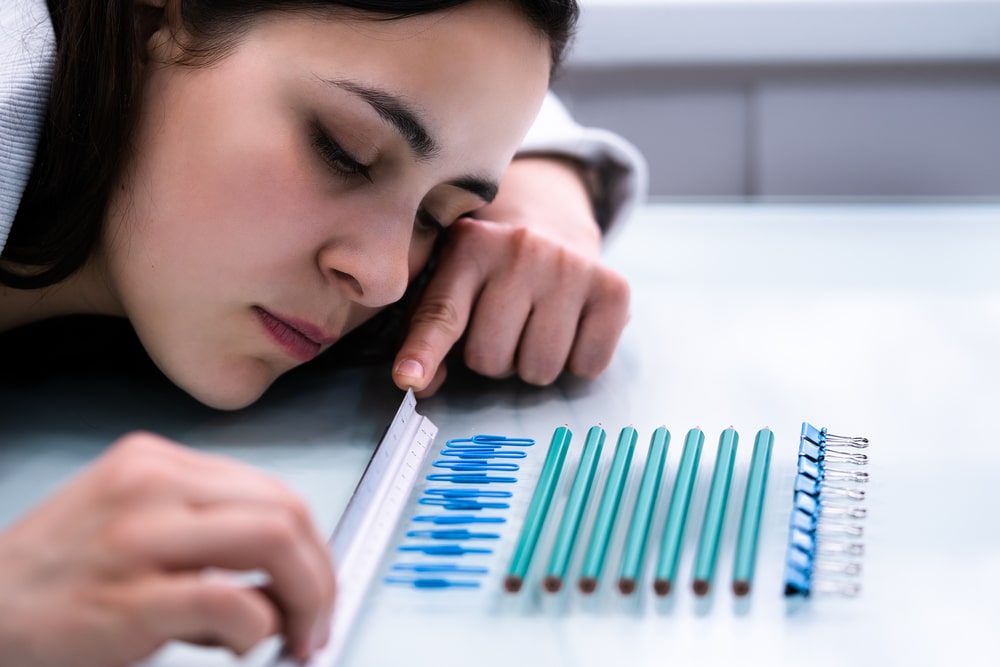Identifying Obsessive-Compulsive Disorder (OCD)
Anxiety disorders such as Obsessive-Compulsive Disorder (OCD) are one of the most prevalent mental health concerns experienced in America today.
OCD occurs when someone experiences recurring, constant irrational thoughts or fears. Those who suffer from OCD often engage in repeated ritualistic behavior, such as obsessive hand-washing, turning on or off lights, or repeatedly opening and closing doors.
One of the most common side effects of dealing with an anxiety disorder such as OCD can be self-medication, which results in addiction. Unfortunately, according to the National Journal on Anxiety Disorders, an estimated 25% of people suffering from OCD also meet the criteria for addiction treatment. This is known as dual diagnosis or co-occurring disorders.
While it may seem that self-medicating can help with OCD, it can often lead to addiction as more drugs and alcohol are needed to combat the obsessive behaviors associated with OCD.
In fact, alcohol and drug use can often worsen the symptoms of OCD and can lead to a vicious spiral of dependency and addiction. Here at Behavioral Health Centers, a leading addiction and OCD treatment center in Florida, we have specialists ready to help you diagnose and treat both OCD and addiction.

Obsessive Behaviors Can Lead to Addiction
Sadly, those who suffer from OCD have been stereotyped and mocked in movies and media. They have been wrongly characterized as crazy people who cannot control their words, body, or behaviors. Generally, these stereotypes are hurtful and untrue.
The most common OCD symptoms are uncontrollable thoughts that lead to intense anxiety and even internal torment. These thoughts manifest tangibly as repetitive behaviors such as hand-washing, bed-making, or constant worries about things being out of place.
Individuals who suffer from OCD are usually aware that their behavior is irrational but feel unable to control it. This internal struggle can sometimes lead to drug or alcohol use to numb this internal conflict.
Other Facts about OCD
Signs and Symptoms of Obsessive-Compulsive Disorder
While OCD can take different forms, it is often associated with generally similar symptoms including but not limited to:
Identifying Addiction
According to the National Health Center, at least 21 million Americans struggle with at least one addiction, yet only 10% of those may seek treatment. One characteristic of someone struggling with addiction is a desire to hide their addictive behaviors from family and friends. It can be difficult to identify a substance abuse issue, but some general signs of addiction include:

Underlying Causes of OCD or Addiction
While some may experience OCD or addictive behavior without any of the following prevailing factors, most patients with these difficulties exhibit one or more of the following:
Genetic Disposition
Often both OCD and addictive tendencies can be inherited from one or both parents, leaving some to suffer by no fault of their own.
Trauma
Often traumatic events can lead to the development of anxiety disorders or the use/abuse of substances as a coping mechanism.
Physiological Imbalances
Both OCD and addictive behaviors can be the result of physiological imbalances in the brain. For example, low serotonin levels have been linked to both anxiety disorders (such as OCD) and addiction issues.
The Effects of OCD
The uncontrollable thoughts and compulsions found in someone who suffers from Obsessive-Compulsive Disorder can have a hugely negative effect on everything from employment to family and social relationships.
As these OCD symptoms become more severe, those who suffer may revert more to avoidance and withdraw significantly from public life around them. They may particularly avoid things that trigger their irrational fears, such as crowds, unknown places, or situations where they feel they do not have control.
People who suffer from severe OCD are generally hyper-aware and often embarrassed about their tics and behaviors and will go to great lengths to hide them. This can cause great strain on families, workplace relationships, and the like.
We want to involve the family and other support groups in the healing process as much as possible and are here to help manage the stress of OCD and the rigors of beginning treatment for OCD.
The Relationship Between OCD and Addiction
People who suffer from Obsessive-Compulsive Disorder are significantly more likely to also struggle with substance abuse issues. In fact, OCD (and other mental health issues such as depression) can feed substance abuse/addiction and vice versa. The diagnosable presence of both OCD and addiction is known as a Dual Diagnosis or co-occurring condition.
In the case of co-occurring conditions, it is important to pinpoint the origins of the individual issues as much as possible to learn if/when one issue is exacerbating the other. There are many reasons why obsessive-compulsive disorder may spur a substance abuse issue or vice versa.
Approaching Someone Struggling with OCD or Addiction
Often, the first step to recovery from an anxiety disorder (such as OCD) or an addiction disorder can be care and attention. While it may seem difficult to approach someone dealing with Obsessive Compulsive Disorder or drug abuse, the alternative of ignoring them can be significantly worse. According to many experts, interventions for these types of disorders often have success rates somewhere between 70% and 90%.
Results are also reported significantly better when the intervention is led by a trained professional, like the ones we have on staff at BHC. It is important to approach someone suffering from these disorders with care, empathy, and real solutions to help them regain control of their life.
We are committed to providing resources and treatment options that remove the fear and difficulty of moving toward recovery or helping a loved one do the same.
It is extremely difficult to watch someone you love struggle with OCD and drug or alcohol abuse, but you are never helpless. It is important to learn as much as you can about the struggle your loved one is fighting. It is also paramount for you to find healthy ways to be a catalyst for positive change. Lastly, make sure you are taking care of yourself first, and are not allowing destructive behaviors to encroach into your own life.
Addiction and OCD Treatment Options
A dual diagnosis occurs when someone meets the criteria for both a mental health disorder (such as OCD) and an addiction disorder such as alcoholism. Patients with a dual diagnosis of OCD and addiction must receive specialized care from professionals who understand how these disorders can interact with each other.
At BHC, we understand that treating a dual diagnosis presents a unique challenge. Our professional staff receives training in both mental health and addiction to best pursue strategies for effective treatment and lasting recovery. At BHC, we are trained to assist with the following proven treatments for both OCD and addiction:
Experience the Behavioral Health Centers Difference Today!
People experiencing OCD symptoms and drug or alcohol addiction require specialized treatment that speaks to both issues independently. At BHC, our addiction and obsessive compulsive disorder treatment team is prepared to help with all forms of mental illness and various levels of addiction. Our program offerings range from simple individual therapy to group options, to outpatient recovery and even inpatient, live-in options for more severe issues.
Our state-of-the-art facilities are designed to help make the transition to recovery as easy as possible. Our various locations include incredible amenities including luxurious pools, adventure trails, comfortable rooms, and spacious facilities.
We have both counselors and Board Certified Psychiatrists on hand to help find the proper combination of treatment and/or medication.







